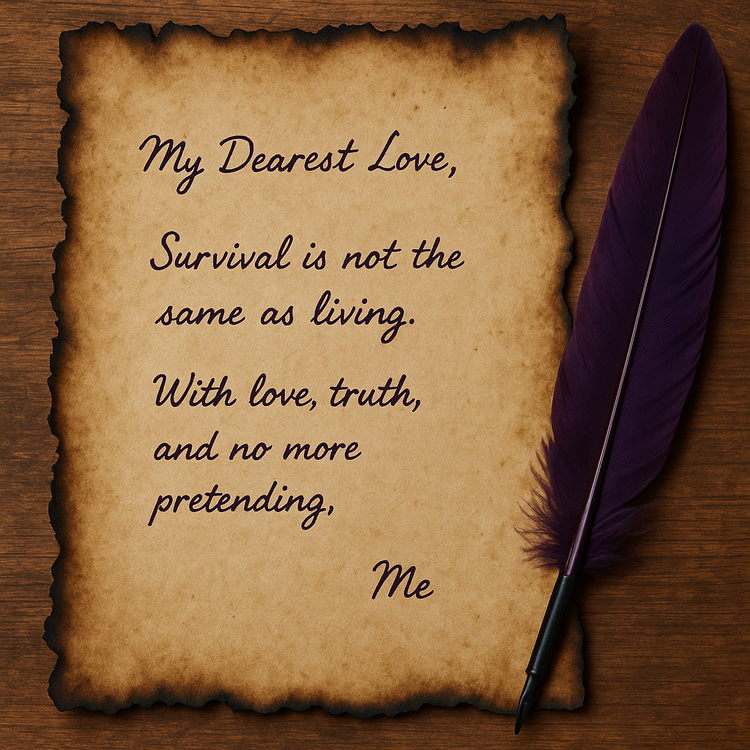The Climb Is the Cage

There’s a lie they tell you about the climb. That it gets easier the higher you go.
That if you just hold your breath a little longer, swallow your tongue one more time, they’ll finally let you exhale at the top. What they don’t tell you is the air thins up there too.
When I first entered the nonprofit sector, I still had the fire. The kind that makes you say yes to extra work, not because you’re trying to prove something, but because you believe. In community. In justice. In being useful. I brought that fish-fry ethic with me—serve first, shine later. If I’m honest, I didn’t even care much about the shine. I just wanted the work to matter.
But somewhere along the way, the climb began. It wasn’t announced. No fanfare. Just someone sliding into your inbox: “Would you be willing to speak on this panel?” “Could you lead this initiative?” “We’d love to elevate your leadership.”
They say elevate like it’s a gift. But most days, it felt more like exposure.
There’s a certain performance to being a in leadership. I don’t just mean the code-switching, we all know that dance, but the full-body armor you develop. The ability to smile while being undermined in meetings. The spreadsheet of receipts you keep in your head because HR never seems to find them. The grace you extend to colleagues who confuse your clarity for aggression. And the number of times you are asked to explain your presence in a room you had to over-qualify to enter.
I once learned I was making tens of thousands less than peers with less qualifications. Another time, after spearheading a multimillion-dollar campaign, the executive of the organization suggested to members of my team, without my knowledge, that they did not have to follow my leadership not too soon after my promotion (which was handled in the most disrespectful manner; but we will save that experience for another day). The message was clear: I could build the house, but I’d never be handed the keys.
And yet, I kept climbing.
Why? Because for so long, I believed in the promise: that if I just worked harder, sharper, longer, it would pay off. That following my mother’s advice to work harder and be smarter would pay off. That being too exhausted to enjoy the weekends was a small price for legacy. That being the only one in the room wasn’t a warning sign, but a badge of honor.
What I didn’t realize was that the climb was the trap.
The nonprofit sector loves a redemption arc. They want your trauma to be your testimony. They’ll applaud your story, so long as it’s digestible. Your pain can be profound, but not disruptive. Your leadership can be visionary, but not threatening. You can bring your whole self, but not your whole truth.
At the top, I found the same disrespect I had experienced at the bottom. Only now it came with a view. A bigger title. A longer to-do list. And less room to say no.
I thought reaching the summit would mean freedom. But it only widened the gap between who I had to be and who I really was. I became the one writing the strategic plans, but I no longer recognized the language. I was quoted in press releases, but unheard in boardrooms. I was lauded for “bringing community voice to the table,” while being silenced when I named the cost of extraction.
That’s when I realized: I had mistaken visibility for value.
The nonprofit industrial complex will let you climb just high enough to see the system for what it is, but not high enough to change it. And if you try, they’ll either isolate you or use your story to market their own commitment to equity. That’s the game. And it’s rigged.
I used to think anxiety, depression and overall stress were the result of working too much. But I’ve come to understand: burnout is often the body’s rebellion against betrayal. The moment your spirit says, I won’t collude with this anymore.
And still, many of us stay. Because we need the check. Because we’ve convinced ourselves the next job will be different. Because we’ve wrapped our worth around being “the one who made it.” Because it’s terrifying to imagine starting over.
I know that fear. Intimately.
But I also know what it costs to keep climbing a ladder that was never built to hold you.
I’m not writing this from the other side of healing. I’m writing this from the edge of truth-telling. From the decision to stop sacrificing my body and spirit for proximity to power that doesn’t protect me. From the slow, sacred process of unlearning the idea that I have to earn my rest.
If you are reading this and you feel it in your bones, in your shoulders, in your neck, in the daily migraines, in your back that never quite stopped aching, I want you to know you are not alone. And you are not crazy. The system is. And survival inside it shouldn’t be the measure of success.
We don’t need more leaders who can endure the climb. We need more truth-tellers who refuse to be caged by it.
So I’ll ask you this: What did the climb cost you? And when you look down, was it worth the price?
This resonated? Subscribe for more like this, directly from me to you. subscribe




Comments ()